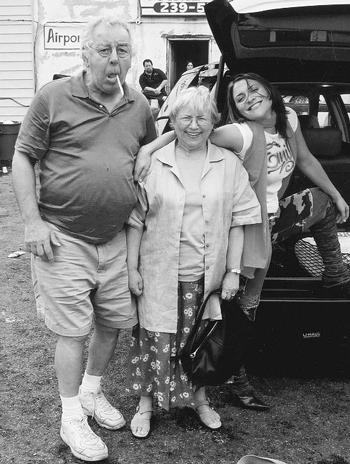Reality TV craze focuses on the foibles of an Upper West Side family
In “Easy Rider,” the road flick of a generation ago, Peter Fonda and Jack Nicholson zoom through the South on their hogs, rebels trying to figure out a society that doesn’t understand them. Their journey ends in tragedy and murder.
“The Talent Given Us” follows an Upper West Side family on a transcontinental journey of self-enlightenment, two generations coping with questions they have never dared ask each other, questions that, for the most part, should probably never be asked.
The Wagners are a different bunch with a different mission that finishes with a less gruesome ending. They are bourgeois and they want to rebel, but can’t quite figure out how.
Whatever happened to the wisdom of letting sleeping dogs lie? This nattering, chaotic film may be a real-life drama, but its creative objective seems muddled. Yet, it does teach us one thing loud and clear––many confidences we utter are perhaps better left unsaid.
From the moment the four protagonists—the parents (played by Judy and Allen Wagner themselves) and their two daughters, no longer children (also played by the Wagner sisters, Emily and Maggie)––get together in Dad’s SUV for their odyssey to L.A., it is non-stop, in-your-face accusations and complaining. Daughter Emily, fresh from the clutches of her therapist, analyzes her mother from the back seat of the car as they careen through Indiana. She blames her for everything under the sun––from the fact that she can’t stay in relationships with men to her need for liposuction.
Emily excels at shocking revelations, such as how her compulsive masturbation was caused by her mother’s refusal to pick her up when she was a child. Just when we think she has run out of things to say, she comes up with another abject shred of maternal scapegoating. She seems to recall as a little girl that her mother said, “No more Christmas presents from Santa because you pee in your pants.” No wonder Emily has boyfriend problems. The ostensible reason for this trip is to visit the family’s screenwriter son in L.A who doesn’t seem to want to have anything to do with them. Who wouldn’t want to keep their distance from this haggling quartet?
Like daughter, like mother. It is not long before Mom unleashes her verbal onslaught. Allen Wagner bears the brunt of her tongue that mostly lashes him about his alleged infidelities during their 46-year marriage. The old guy tries to be stoic, mostly grunting. He gnaws and sucks on a plastic straw as a way of answering this blizzard of recriminations. Judy carries the harangue to the mattress. When the old boy is just about to shut his eyes for a much-needed night’s sleep, Judy blurts out without a scintilla of charm, “Fuck me!” like a waitress in a diner, yelling out to the short-order cook. Allen rolls his eyes, turns over and replies, “Wake me in an hour.” Needless to say, he sleeps until morning.
Judy is a funny lady and comes up with some well-timed zingers as the Wagners’ modern-day Conestoga wagon makes its westward progression. Caught by the rural charm of the Midwestern prairie, they stop their vehicle to admire the endless corn fields. Nearby, sleek, contented cows graze quietly in a meadow. Suddenly Judy rolls her eyes in mock terror and says, “The cows are getting close, let’s go!” as she tears off for the car. Only a veteran of Zabar’s shopping aisles could summon up such genuine fear of the bucolic life.
Other attempts at humor fall more than a bit flat. Somewhere along the road, they pick up Bumby (Judy Dixon), an Anna Nicole look-alike. In a scene that should have hit the cutting-room floor, Bumby and Emily are engaging in mutual masturbation as a way of losing weight.
Finally, the gang reaches L.A., but son Andrew, the object of their search, is nowhere to be found. No matter, they unwind and get into a West Coast mood. It must be the California sunshine; gradually the kvetching subsides and currents of tenderness appear. They realize that “we all have things we have to live with” and that “we are all on a journey. If you want to find the meaning of life, stop searching––fulfillment is here, now.”
Maybe the whole Upper West Side should move to California. Brief encounters with working-class people seem to have a magical, healing effect on the Wagners. The Latina cleaning lady and her husband in Emily’s L.A. apartment, a black waitress who serves them in a diner in the Midwest. Perhaps the straightforward, uncomplicated example of these joyous, “real” people teaches our complicated Manhattanites where happiness is to be found. By the end of the film, they seem more content, if only for the time being.
gaycitynews.com



































